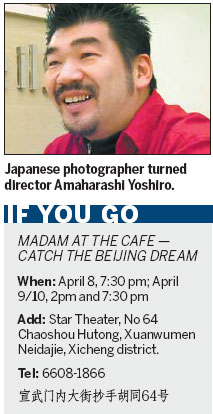
|
The amateur cast of Madam at the Cafe - Catch the Beijing Dream. Photos provided to China Daily |
Such is the power of drama: watching several absurd and miserable lives unfold against a plain backdrop, you find yourself laughing and crying until the curtain call awakes you to the fact that the actors were speaking Japanese and you did not understand a word of it.
And you will be even more astonished when you discover that all the actors are amateurs.
How can their performances be so convincing and emotionally engaging?
Director Amaharashi Yoshiro says it is due to the power of real life.
"I think the key to a convincing performance is giving actors the possibility of relating their acting to reality," Yoshiro said.
To create this possibility, Yoshiro observes the actors' behavior and listens to their personal stories, and then uses these realistic ingredients as the basis for their performances. This use of real life experiences is also how Yoshiro, a photographer turned director, makes up for his own lack of formal training.
To go for something new is always exciting, he said, just like years ago when he left Japan to come to China to seek inspiration.
The play, called Madam at the Cafe - Catch the Beijing Dream, is based on a well-known Japanese play called Madam at the Cafe, which since its debut in 1990 has been frequently revised and performed around the country. After acquiring permission to adapt the play, Yoshiro created a Beijing version of it by adding the real experiences of Japanese living and working in Beijing.

The story revolves around a young Japanese man called Shinji who comes to Beijing with the dream of becoming an action star.
However, while his old actor friends back in Japan become increasingly successful, Shinji works in a Chinese wholesale shop.
Shinji's misery is later mixed with love. In order to see the beautiful madam of a cafe, Shinji agrees to receive training that his colleagues say will make him a better man. The torturous process, which does not win him his dream lady, instead increases his determination to become an action star.
While Shinji's dream to be an action star seems unattainable, the actors say their own dreams are equally big and admirable, and hopefully achievable.
"I am interested in Chinese literature between the 1920s and 1940s, a flowering that saw the emergence of many great Chinese thinkers and writers. Having absorbed the nutrition of thousands of years of Chinese civilization and combined them with modern values, Chinese contemporary thought during that period is enlightening and interesting," said Kurashige Taku, the main actor in the play and a master's student at Tsinghua University.
He said drama is a good way to show a Chinese audience the mentality of Japanese living in Beijing. That little understanding, he hopes, will contribute to the mutual understanding between the two peoples.
That same idealism is shared by another actor, Kawanabe Makoto, who said his dream is to promote mutual understanding between Chinese and Japanese businessmen.
"These person-to-person communications, including drama, are obviously effective at building bridges between cultures," said Eiko Chen, a Japanese-Chinese actress in the cast who says she is the real cultural bridge in the group.
|
The actors work through their act for the coming performance in April. |